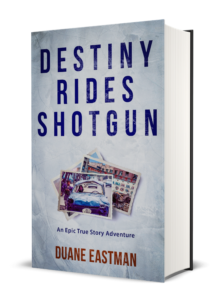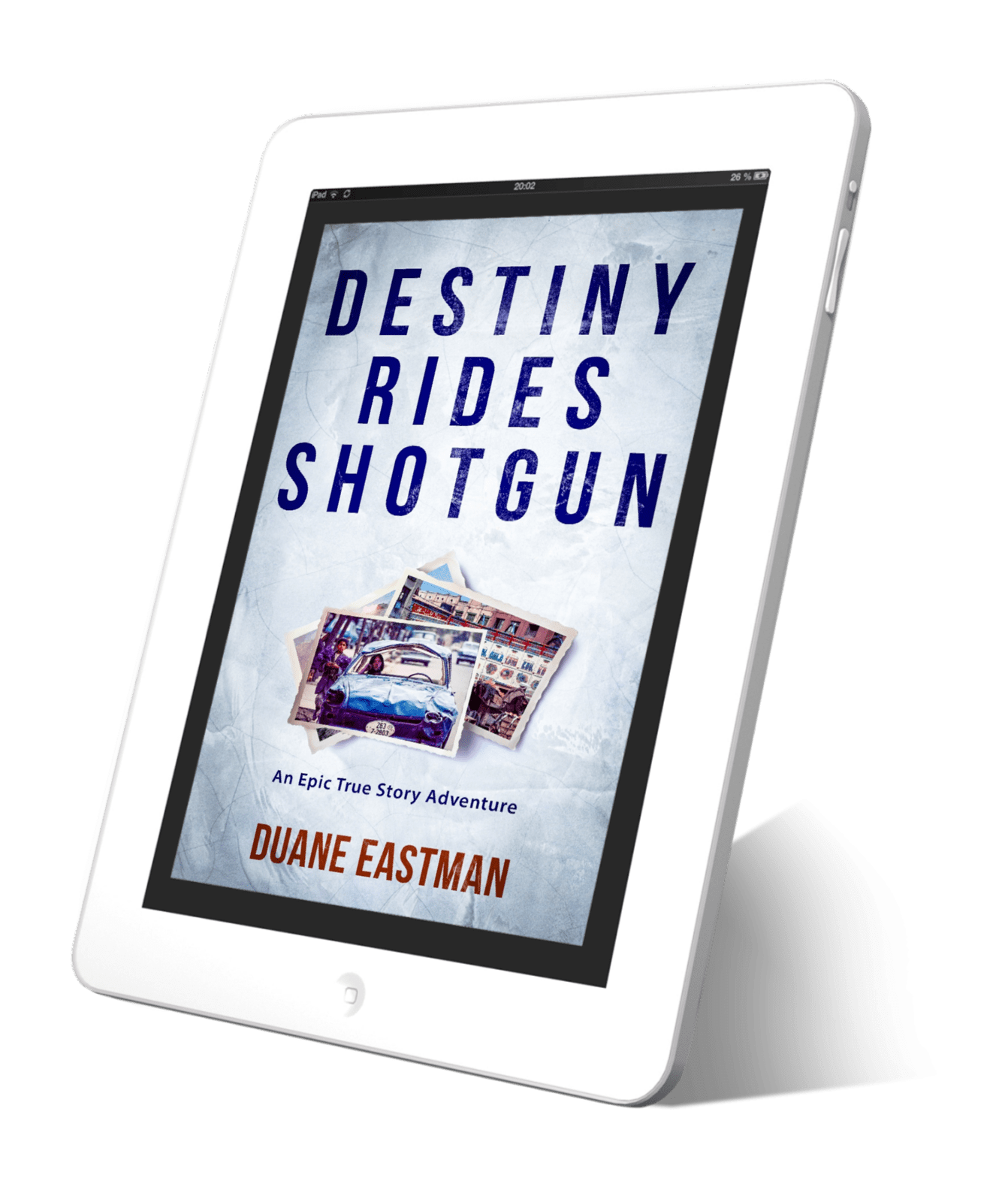About The Author
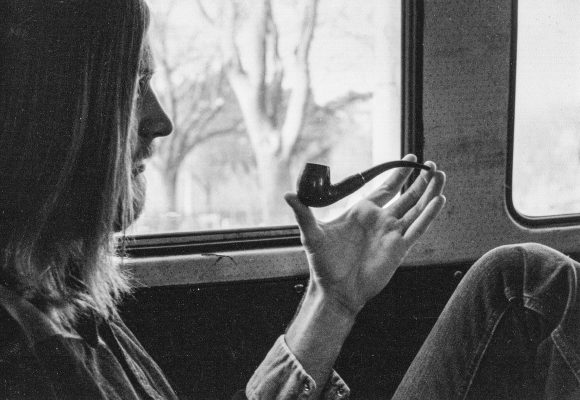
My Story
Destiny Rides Shotgun Book
Talk about a noob, I stumbled into travel as a pre-teen without any thought or preparation. I was too young to realize it would put me in contact with different customs, formalities, values, and later, languages. But I sure had fun and that was the determining factor to snag my attention.
As an adult, my Midwest USA upbringing was laid bare in my first trip to Europe. My thorough lack of knowledge regarding world geography, history, and naivety in politics, was a mark of a travel newbie. It continued to be an inconvenience until I had enough travel experience.
Travel, in my estimation, is the best education one can have. Foreign travel is Graduate School. That experience pays dividends throughout life, granting knowledge, wisdom, and humility to those who seek it. There’s no diploma to hang on your wall but it adds authenticity to your Life CV. The experiences in Destiny Rides Shotgun qualify for a Masters Degree in Travel.
My Story (cont.)
First Solo Travel & Return to the Norm
The Boy Scouts National Jamboree in Valley Forge, Pennsylvania was my first taste of solo travel. I was twelve years old and was both excited and nervous at the prospect of being “on my own.” It was a sanctioned event with gobs of adult guidance and oversight, but I was the only one from my scout troop. Some details of that drama are in the book. Having gained some worldly experience on the trip, I returned to the insular life in small town Missouri and fell into a familiar pattern while absent mindedly navigating Middle School. Without much drama, I found myself in High School where the action picked up.
My first academic fork in the road came suddenly and unexpectedly via my father when I was fifteen. It held no interest to me at all—a dead end, not a fork in the road. More about that below.
I wasn’t challenged by the class work in high school and my attention was focused elsewhere with girls and cars at the top of the list.
Music Saves the Day (and Life)
On a parallel educational path was the Columbia Record Club membership. Music! The liberation of youth’s enslaved mind and soul from the establishment. Columbia offered it to you for free! That’s right, join the club and receive your first record album for free. Thereafter you would receive a shipment of albums each month in the “mail” from the choices you selected. Once started, the albums, and the monthly charge never stopped! Unless you persevered through the seemingly endless process to terminate the membership in the club. But it was fabulous to open that package each month and listen to the music that freed your mind and heart from the wretched chains of society and coordinated attempts by the highest level of authority – teachers and parents – to squelch your efforts to have fun. The Destiny Rides Shotgun sound track has its origins in some of those albums.
Initial Combat
My father loved the military, he was a P 38 fighter pilot in WW2. The fastest single seater attack fighter in the world. The military had been his way out of a blue-collar future. He was driven and successful in that, and later, in business. There’s no doubt he was a devoted and loving husband and a wonderful and caring father to his six children with many admirable qualities. However, his love of the military life endured. His presumption that his eldest son woud share a similar feeling was mistaken.
Unknown to me, and shocking when it emerged, was a plan to steer me into university. Not just university, but the Air Force Academy in Colorado Springs. He had quietly (at least to me) marshalled his contacts that had influence with the Governor of Missouri to obtain an appointment on my behalf. Surely a wonderful opportunity for his son and satisfying for him.
Stalemate
I would have none of it. If the word “aghast” had been in my vocabulary then, I’d have applied it to the situation. If I’d had sufficient worldliness, then “humored” could also have been in my reaction. But he was sincere, proud, and chuffed to offer that opportunity to me. Even in my blissful ignorance I could sense we had a situation going on. I’m sorry to state that my response was a bluntly selfish “I’m not going there.” A moment of silence was deafening in its meaning. That would become a defining point in our long-term relationship, and not a good one.
In hindsight, the Air Force Academy is a Dot I chose not to embrace. Music is a Dot that pointed me to the academic path I preferred – travel.
The Spotify playlist I created for Destiny Rides Shotgun is here. I hope you feel the same sense of freedom and joy that I do when you listen to songs that fueled my adventures.
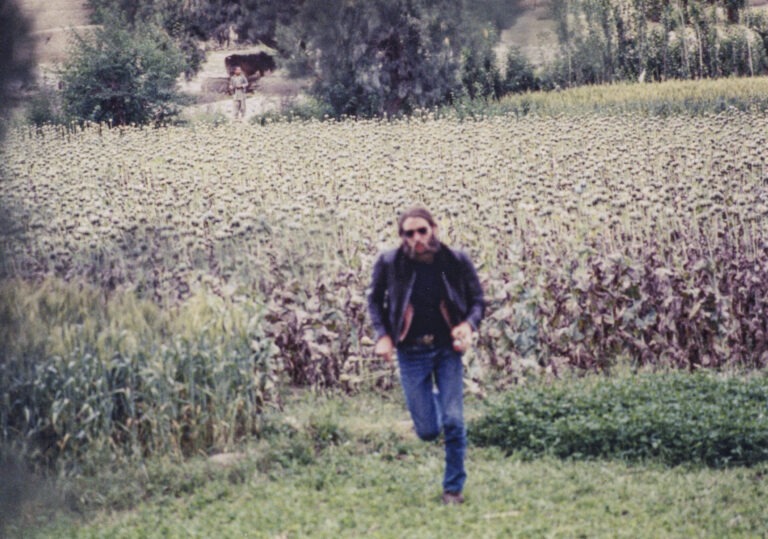
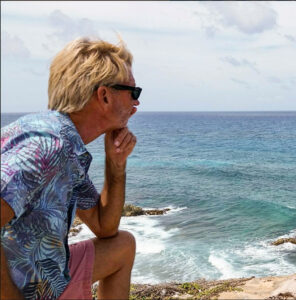
Duane Talks About Writing
I attribute my desire to write, particularly to writing a book, to questions. I’m told I pestered my father with “why?” constantly. At about six years old, he’d had enough and told me to stop saying “why?”. I promptly switched to “how come?” As I would later learn, asking questions merged flawlessly with travel. As the old saw goes, men won’t ask for directions. But try to find your way around the streets of Amsterdam without asking for a reference point! Do you know where I can find the ATM? Where is the nearest taxi stand? Can you recommend a good restaurant? But more insightful questions about culture, religion, and even sports can open the door to greater understanding of many things. Questions are fundamental to enjoy travel and benefit from it. Questions lead to insight and from that a good story can emerge.
About Writing (cont.)
What, Me Worry?
With an amateur jazz drummer for a father and a piano playing mother, one would think the piano lessons I took in my preteen years would have found fertile ground. Not so. I really wasn’t interested in playing music. I did listen often to the records they played—big band, lots of saxophone stuff like Boots Randolph, and swing jazz. As previously mentioned, the Columbia Record Club brought Rock & Roll music in the mail every month. The Yardbirds, Rolling Stones, Moody Blues, and more would show up years later on the Destiny Rides Shotgun sound track.
When TV came to our home, I wasn’t greatly interested in watching it very much. And when I wasn’t playing outside, I read a lot: Rudyard Kipling, Edgar Allen Poe, Jules Verne, Alexandre Dumas, and for educational purposes, Mad Magazine.
The Great Outdoors
At about the age of six I started tagging along with my father and his friends quail hunting and got my first shotgun at the age of eight. I was taught gun safety and respect for wildlife, which led to the love of the outdoors. All the preparation the night before with my dad—cleaning the guns, polishing hunting boots, and talking about previous trips was a thrill. Getting up early in the morning, checking and organizing the gear, the car ride out of town with dad and his buddies, then walking out into the brisk fresh air was all very exciting. The entire process was unknowing preparation, and practice of a sort, for future travel.
Music In the Beginning
During high school I had my first significant run-in with writing. More specifically, the music I was listening to then. That was in a small Midwestern town in the US of A in the latter part of the 1960s. It’s a bit of a stretch to infer that my writing originated from listening to music, but hey, I need a starting point somewhere.
The music readily available to us generally lagged the East and West coasts by a year or so. At least the radio stations we listened to locally did. Our alternative was KAAY in Little Rock, Arkansas. It was an AM radio station that broadcast from a very powerful radio tower. If you had a transistor radio, small enough to hide under your covers at night when you were supposed to be sleeping for school in the morning, you could receive the signal and listen to Clyde Clifford’s Beaker Street. The eerie background music was a kind of forerunner to psychedelic a few years later. Beaker Street was one of the early radio stations to play album music – songs longer than the standard two minutes or so of pop music.
During the day on your car radio, it was both kinds of music: Country and Western. Or a station with lots of commercials between what little Rock & Roll snuck in. As ridiculous as it sounds now, I had a Rube Goldberg installation of a record player in my 1961 Chevrolet convertible. The R&R LP’s I received through Columbia Record Club were a welcome addition to the poor music selection on AM car radio. The Flying Wreck in Destiny Rides Shotgun updated that concept with a cassette player.
Music to My Ears
As the availability of more up-to-date music improved, I started listening to Simon & Garfunkel. Their music grabbed me and burrowed into my psyche. One particular song from the Parsley, Sage, Rosemary and Thyme album resonated deeply with me. Click here to read the lyrics of “A Poem on the Underground Wall“. I had to go to the record store to find the lyrics, as I needed to make sure I heard them correctly. Yep, they were a sirens song to my restless ears.
Music the Source of Writing
Of importance to this story is Verse 4 of that song which contains a reference to the crayon that writes the four-letter word poem. A certain four-letter word that is quite common in the vernacular now, but then it was outrageous and verboten to put in print or utter on airwaves. I was convinced the word referred to was f-u-c-k.
Where’s the relevance, you may ask. A book has words and sentences. A song has lyrics which has words in kind of a sentence arrangement. And this song was about a poem which also has words in sentence form. The importance of how all of that can be related was lost on me and escaped any real consideration.
I held the opinion that a book, a song, and a poem were distinct and separate items with no overlap. That they could interact and share form and function was a later realization.
However, in what must have been a coincidence, or at the very most an unconscious thought, the structure of a poem was soon put to work in a practical way.
The Syndicate
I was one of the four founding members of a “club” that we dubbed The Syndicate. It was a bit of a joke to us but was made out to be a secret society with nefarious purpose by some of our high school classmates. The teachers and administration got wind of it and their suspicions trickled down to the student body.
As you would expect, The Syndicate hung out together, drank (illegally) together, and tinkered with cars together. A cliquish group for sure but we were innocent of the reputation that our fellow students bestowed upon us and certainly were not the devil incarnate that the high school administration imagined. We “allowed” chosen others to hang with us including the popular sports jocks and the intelligentsia, including our class president.
Music the Instigator
I can’t be sure of this, as my recollections can be sketchy, but the legend has it that somehow the idea surfaced that he, El Presidente, should write that four-letter word poem from Simon & Garfunkel on the wall in the boy’s restroom. He apparently did, and with very few details forthcoming from Mr. Dikeman, the school Vice Principal and enforcer of rules, the rumor was his artwork was found quickly by the janitor.
Although The Syndicate was not present for the event, we were presumed involved. The rumor quickly spread that rather than using a crayon to write with, he chose an alternate. It too was a four-letter word: t-u-r-d. The alleged act quickly cemented our class president’s reputation as “cool” to much of the student body. Not so much the school administration. The Syndicate of course got thrown under the bus, but not by the Prez.
If nothing else, the utility of good writing didn’t escape me.
Onward to University
I hung around the underground newspaper at university which escalated my stand against the war in Vietnam. That culminated with me and a friend hitchhiking to Washington D.C. in the early 70s to join a protest of the war. There was also a lot of live music to entertain. We both were caught up in a police force sweep and hauled off to jail along with hundreds of other noisy, angry, and not a few stoned hippies, us included. It got even noisier when we were pepper gassed by either irritated guards or perhaps for entertainment. My infraction was driving an ambulance.
Raymond and I were included in a group that was bailed out by, as I recall, the publisher or other ranking corporate figure of the Washington Post newspaper. Shortly after the release, we found ourselves whisked off to the Georgetown home of said person. He had two lovely daughters and a beautiful home. Quite a dramatic change from the D.C. city jail.
When I returned to the university campus, I saw things differently. I perceived that there was a hierarchy in the antiwar movement. A structure of power that required you to accept authority and play by the rules, as unstructured as they were. It reminded me of the lyrics in The Who’s song Won’t Get Fooled Again that sagely warn that the new boss is the same as the old boss. My opinion of the war didn’t change, but I moved on with my young life.
I continued with my reading, mostly philosophy and counterculture favorites: Kerouac, Thompson, Vonnegut, Heinlein and Kesey among them. Reading presented me with a world that was far bigger than I realized with delightfully weird people and ideas. It became clear that I needed to “get out of Dodge” and check it out.
A Taste of Europe
That opportunity presented itself and I jumped. Hitchhiking in Europe was a huge turning point in my life. The school of the road appealed to me, and the useful lessons came fast and furious. My bothersome habit as a child of always pestering my father with questions was a useful tool to fall back on and I found traveling fertile ground to cultivate. Questions became a direct link and a source of inspiration to writing much later.
Preparing For the Long Haul
In the early 80s I was a one-man in-house advertising agency for a family-owned manufacturing company. That was before PC computers came on stream in small businesses. I conceived, composed, and manually produced the catalogs, price lists and brochures. My activities expanded to doing the same for print ads in trade magazines. In due course I also took the product photos, developed them in the darkroom, and wrote the copy. Then I manually created each layout page one letter at a time with a then innovative process that took hours, compared to minutes, on a computer. Finally I burned the plates for the two-head, four color, printing press – I can still smell the ink.
Learning and understanding what was involved in creating and producing a printed brochure was a valuable lesson and gave me a base of understanding to build on when I started to write Destiny Rides Shotgun.
The knowledge I gained as a photographer by shooting film, understanding light, and processing it in the darkroom was also invaluable. It was a solid footing when I transitioned from film to digital. Analogous to that, it was much the same with writing. The fundamentals I learned with my in-house ad company work at copy writing, layout work, and final production laid the groundwork to apply to book writing.
A Ton of Photographs
Over decades of travel, I had shot thousands and thousands of photos (negatives) and color slides. Most went into storage. As the subsequent years passed, they were cautiously moved from location to location, taking care to ensure their safe retention. I treasured them and relished the knowledge that one day I would take the time to go through them and carefully organize them into countries and time periods. The tipping point for me to consider writing came when I finally started digitizing my old film negatives and slides in the fall of 2021.
When I got organized to stop procrastinating and do something, I bought the needed digitizing equipment and started work. It was a lot of work, way more than I anticipated. But I was thrilled. They spoke to me. As you would imagine, each slide or neg was a visual reminder to me of time and place. In my minds ears and nose, I could hear and smell the events depicted in each photo.
It was easy to create a mental story board, a running dialogue piecing together the concept in this slide with the other slide(s) I was digitizing. I started taking notes and then began writing a memoir of sorts. And within months, it morphed into an idea for this book.
Then the work to write and publish the Destiny Rides Shotgun book began in earnest.
"Your future and your past are defined by the Dots you embrace."
Duane Eastman
Follow @duane_playa
Duane lives by the sea in Playa del Carmen. His writing is inspired by the tropics and he posts photos from time to time.

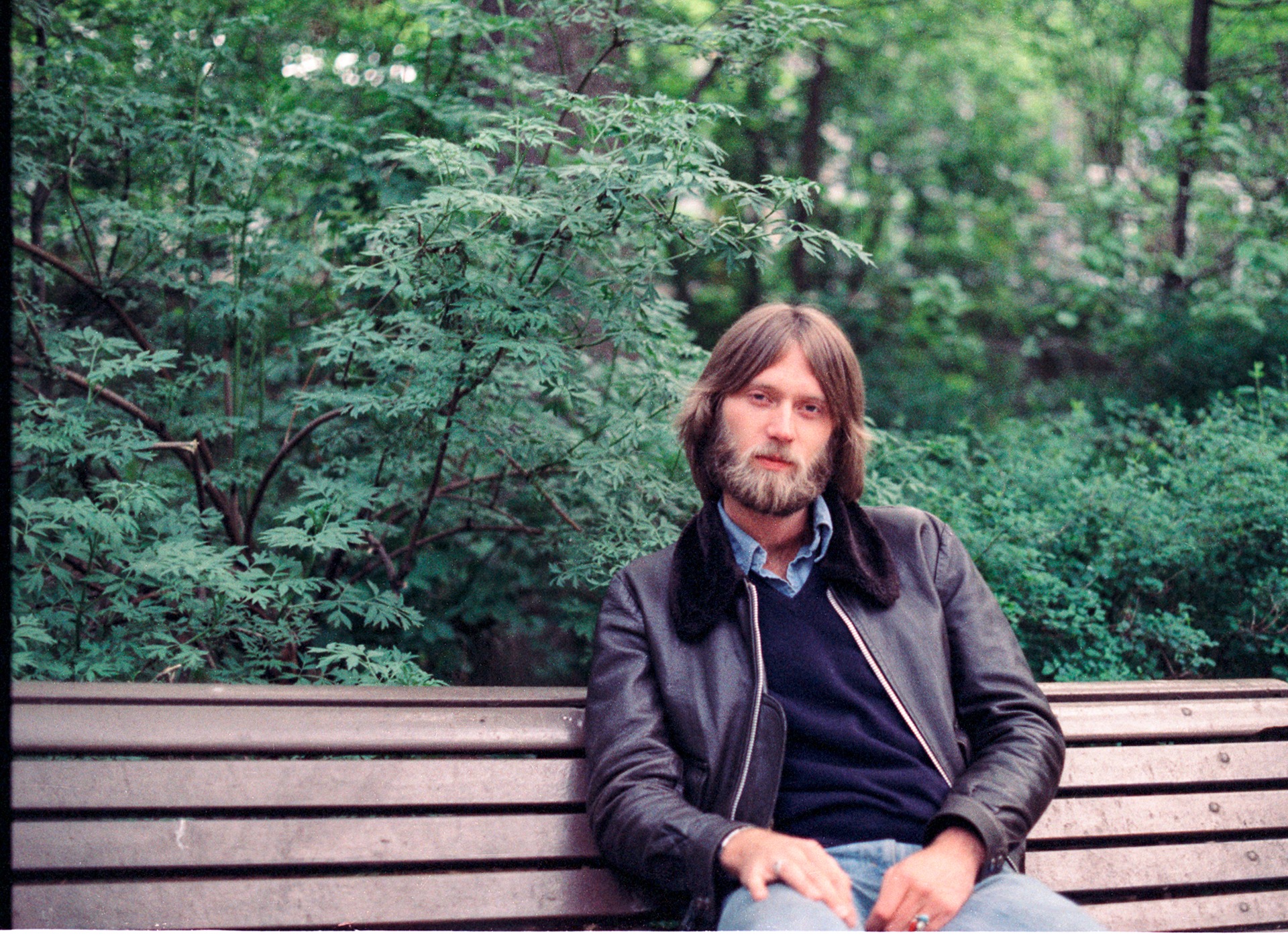
What Is Your Experience Connecting Your Dots?
Dots play an important part in everyone’s life, whether they realize it or not. I didn’t give Dots any thought at all until much later in my life. Now, I wonder what could have been if I was aware of and alert to them earlier. I’d love to hear about your point of view and any experience you’ve had with Dots in your life.

